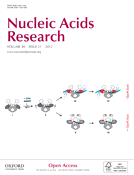
CHROMOSOMA
Scope & Guideline
Pioneering Research in Genetics and Beyond
Introduction
Aims and Scopes
- Chromosome Structure and Function:
Research focusing on the physical and functional aspects of chromosomes, including centromere architecture, chromatin organization, and the role of histone modifications in gene regulation. - Meiosis and Gametogenesis:
Studies examining the processes of meiosis, including chromosome alignment, segregation, and the genetic implications of meiotic errors in various species. - Epigenetics and Gene Regulation:
Exploration of how epigenetic modifications influence chromosomal behavior, gene expression, and the inheritance of traits across generations. - Cytogenetics and Karyotype Evolution:
Research on the evolution of karyotypes, chromosomal painting techniques, and the implications of chromosomal variations in different species. - Genome Integrity and Stability:
Investigations into mechanisms that maintain genome integrity, including responses to replication stress and mechanisms of DNA repair. - Technological Advancements in Chromosome Research:
Development and application of novel methodologies such as super-resolution microscopy and synthetic DNA libraries to study chromosomal structures and functions.
Trending and Emerging
- Mechanobiology of Chromosomes:
An increasing focus on how mechanical forces influence chromosomal behavior and organization, highlighting the intersection of physics and biology in understanding chromosomal dynamics. - Transgenerational Epigenetics:
Research exploring how epigenetic modifications can be inherited across generations, revealing significant implications for understanding heredity and evolution. - Advanced Imaging Techniques:
The use of cutting-edge imaging technologies, such as super-resolution microscopy, is on the rise, enabling researchers to visualize chromosomal structures and interactions at unprecedented resolutions. - Karyotype Dynamics in Polyploidy:
A growing interest in the study of polyploid organisms and their chromosomal adaptations, which is crucial for understanding plant and animal evolution. - Synthetic Biology Approaches to Chromosome Study:
Emerging methodologies utilizing synthetic DNA libraries to investigate chromatin and gene regulation, indicating a shift towards more experimental and synthetic approaches in chromosome research.
Declining or Waning
- Classical Cytogenetics:
Research that primarily focused on traditional cytogenetic techniques and basic chromosomal mapping has decreased, as newer, more advanced methodologies gain prominence. - Human-Specific Chromosomal Studies:
Studies concentrating exclusively on human chromosomal abnormalities and their clinical implications have seen a reduction, likely due to the broader focus on comparative genomics and model organisms. - Single-Cell Chromosome Dynamics:
While still relevant, the frequency of studies examining single-cell dynamics of chromosomes has diminished in favor of more integrated approaches that consider multi-cellular contexts and interactions.
Similar Journals

GENOME RESEARCH
Exploring the Frontiers of Genetic ScienceGenome Research, published by Cold Spring Harbor Laboratory Press, stands as a premier journal in the field of genetics, featuring rigorous peer-reviewed research that explores the complexities of genome organization and function. With an impressive Q1 ranking in both Genetics and Clinical Genetics according to the 2023 category quartiles, this journal effectively bridges the gap between fundamental genetic science and its clinical applications. Its significance is further highlighted by its Scopus rankings, where it ranks #6 out of 99 in Clinical Genetics and #27 out of 347 in Biochemistry, Genetics, and Molecular Biology, showcasing its broad influence and access to cutting-edge discoveries. Researchers and professionals can look forward to a diverse array of articles that cover genomic technologies, bioinformatics, and translational genomics. Although not currently open access, the wealth of information available in each issue makes it an invaluable resource for anyone engaged in genetic research and applications.

BIOCHEMICAL GENETICS
Connecting Biochemistry and Genetics for a Sustainable FutureBIOCHEMICAL GENETICS, published by Springer/Plenum Publishers, is a prominent journal in the fields of biochemistry, genetics, and molecular biology, with a substantial impact on the scientific community since its inception in 1967. The journal holds a significant position within various academic quartiles, ranking Q2 in Ecology, Evolution, Behavior and Systematics, and Q3 in Biochemistry, Genetics, and Medicine (miscellaneous), among others, demonstrating its diverse and interdisciplinary reach. With an ISSN of 0006-2928 and an E-ISSN of 1573-4927, it is recognized for contributing critical research insights and methodologies that drive the fields of biochemical genetics forward. Although it is not an Open Access journal, it provides vital access options and resources for researchers globally, facilitating the dissemination of knowledge across institutions. Positioned within the competitive landscape of Scopus rankings, it maintains respectable standings across its focused areas, making it an invaluable resource for researchers, professionals, and students seeking to deepen their understanding of genetic mechanisms and biochemical processes.

Comparative Cytogenetics
Advancing Knowledge in Cytogenetics and BeyondComparative Cytogenetics, an esteemed journal published by PENSOFT PUBLISHERS, is a pivotal resource in the fields of animal science, biotechnology, genetics, insect science, and plant science. Since its inception as an Open Access journal in 2009, it has significantly contributed to the democratization of scientific knowledge, allowing researchers and students across the globe to access cutting-edge developments in cytogenetics. With an impressive range of articles published from 2010 to 2024, this journal has achieved a commendable impact within the academic community, earning a Q3 ranking in Animal Science and Zoology, Biotechnology, and Insect Science, as well as a Q4 ranking in Genetics, indicating its growing influence. Its Scopus rankings reflect a solid standing, with notable percentiles showcasing its relevance across diverse biological sciences. Located in Sofia, Bulgaria, Comparative Cytogenetics serves not only to disseminate research but also to foster collaboration in understanding cytogenetic dynamics, making it an essential platform for professionals, researchers, and students alike.

Sexual Development
Connecting Genetics, Environment, and HormonesSexual Development is a distinguished peer-reviewed journal published by KARGER, focusing on the intricate biological processes underpinning sexual differentiation and development across various organisms. With an ISSN of 1661-5425 and an E-ISSN of 1661-5433, the journal has established itself as a vital resource for researchers in the fields of Developmental Biology, Embryology, and Endocrinology. Hailing from Basel, Switzerland, this journal is committed to disseminating high-quality research that explores the complexities of sexual development, including genetic, environmental, and hormonal influences. With considerable recognition in the academic community, it currently holds a Q2 ranking in Embryology and Q3 rankings in both Developmental Biology and Endocrinology, Diabetes and Metabolism. Researchers and professionals are encouraged to contribute to and access its wealth of knowledge, thereby advancing understanding and discovery in this critical area of biological research. The journal's continuous publication since 2006 reflects its dedication to evolving the discourse and knowledge base surrounding sexual development, making it an essential platform for scholars in the field.

Molecular Cytogenetics
Unveiling the Mysteries of Genes and Chromosomes.Molecular Cytogenetics is a prestigious open-access journal published by BMC, dedicated to advancing the fields of biochemistry, genetics, and molecular biology. Since its inception in 2008, this journal has facilitated prominent research and developments in the cytogenetics domain, featuring innovative studies and reviews that explore the intricate relationship between cellular structures, genetic makeup, and various biological processes. With a robust impact factor and a commendable positioning within Q3 and Q4 categories across multiple relevant disciplines, it provides a vital platform for researchers to disseminate their findings to a global audience. The journal's open-access model ensures that cutting-edge research is readily available to students, professionals, and scholars, promoting free knowledge exchange. Situated in the vibrant landscape of the United Kingdom, Molecular Cytogenetics continues to contribute significantly to scientific progress, solidifying its role as an essential resource for those engaged in the exploration of genetic and cytogenetic inquiry.

Mitochondrial DNA Part A
Navigating the Frontiers of Mitochondrial ScienceMitochondrial DNA Part A, published by Taylor & Francis Ltd, is a distinguished journal dedicated to the exploration of mitochondrial genetics and its implications for health and disease. With an ISSN of 2470-1394 and an E-ISSN of 2470-1408, this journal serves as an open-access platform, promoting the dissemination of high-quality research in the field. Operating from the United Kingdom, it offers a vital resource for researchers and professionals keen to delve into the rapidly evolving landscape of mitochondrial studies. Although currently ranked Q4 in both the Genetics and Molecular Biology categories, the journal continues to be a valuable outlet for emerging findings that could impact our understanding of cellular processes and hereditary conditions. Researchers can access articles and data covering recent advancements from 2016 through 2022, with ongoing contributions expected in 2024. As the field grows, so too does the importance of this journal as a source of knowledge and collaboration for the academic community.

PROGRESS IN BIOPHYSICS & MOLECULAR BIOLOGY
Unveiling the secrets of life through rigorous scientific inquiry.PROGRESS IN BIOPHYSICS & MOLECULAR BIOLOGY is a leading scholarly journal published by PERGAMON-ELSEVIER SCIENCE LTD, focusing on the rapidly advancing fields of biophysics and molecular biology. With a rich history dating back to 1960, this journal has become a pivotal platform for disseminating high-quality research and innovative findings from both established and emerging scientists alike. Leveraging an impressive Q1 ranking in Biophysics and a Q2 ranking in Molecular Biology as of 2023, it stands out in the academic landscape, garnering significant attention and citations. The journal is preeminent in providing researchers with a comprehensive forum to explore the intricate interactions at the molecular level, essential for breakthrough advancements in medicine, biotechnology, and environmental science. Though it does not offer open access, it continues to pursue excellence in publishing with a commitment to advancing knowledge and fostering collaborations across disciplines. As the field evolves, PROGRESS IN BIOPHYSICS & MOLECULAR BIOLOGY remains an invaluable resource for professionals and students aiming to stay at the forefront of biophysics and molecular biology research.

NUCLEIC ACIDS RESEARCH
Illuminating the Pathways of Nucleic AcidsNUCLEIC ACIDS RESEARCH, published by Oxford University Press, is a premier peer-reviewed journal in the field of genetics, holding a prestigious Q1 ranking in this domain as of 2023. Since its inception in 1974 and with a converged publication horizon extending to 2024, this journal has established itself as a vital resource for researchers and professionals interested in the molecular aspects of nucleic acids, encompassing DNA and RNA studies as well as their implications in biochemistry and molecular biology. With an impressive Scopus rank of #6 out of 347 in Genetics, this journal is positioned in the 98th percentile among its peers, highlighting its significant impact and relevance in the scientific community. As an open access journal since 2005, NUCLEIC ACIDS RESEARCH ensures wide dissemination of knowledge, promoting collaborative advancements in genetic research. For those looking to stay at the forefront of nucleic acid research, this journal remains an essential publication for accessing cutting-edge findings and innovative methodologies in the field.

DNA AND CELL BIOLOGY
Pioneering Insights in Genetics and Cell BiologyDNA AND CELL BIOLOGY, published by Mary Ann Liebert, Inc, is a distinguished journal in the realms of cell biology, genetics, and molecular biology, holding a notable position in its Q3 and Q2 quartile rankings across multiple academic categories as of 2023. With an ISSN of 1044-5498 and an E-ISSN of 1557-7430, this journal has been a pivotal platform for the dissemination of cutting-edge research since its inception in 1990, extending its coverage through 2024. Situated in the United States, the journal offers high-quality peer-reviewed articles, exploring significant advancements in biological sciences while fostering interdisciplinary collaborations within the research community. Though it currently does not offer open access, subscribed institutions and individual readers benefit from its rich repository of knowledge. The journal's rigorous standards and impactful content make it an essential resource for researchers, professionals, and students alike, aiming to stay at the forefront of discoveries influencing DNA and cellular dynamics.

Global Medical Genetics
Pioneering Research for a Genetic RevolutionGlobal Medical Genetics is a premier open-access journal dedicated to advancing the field of medical genetics. Published by GEORG THIEME VERLAG KG, this journal has been providing a dynamic platform for disseminating cutting-edge research and clinical findings since its inception in 2020. With the ISSN 2699-9404, it serves as an essential resource for researchers, healthcare professionals, and students who seek to explore the complex interplay between genetics and medicine. The journal aims to foster collaboration and innovation in the genetics community, addressing a diverse range of topics from genetic disorders to the application of genomics in personalized medicine. By providing open access to its content, Global Medical Genetics enhances knowledge sharing and accelerates advancements in healthcare, making it a vital asset for anyone invested in the future of genetics.